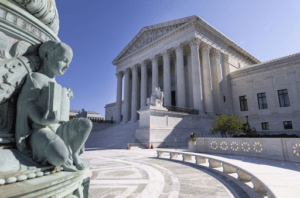U.S Supreme Court declines to hear rent stabilization cases
 Source: Politico
Source: Politico
On February 20, the Supreme Court denied requests to hear the appeals of two cases relating to New York City’s Rent Stabilization Law (RSL). The two cases came from trade organizations and the owners of apartment buildings in New York City, who believe the RSL is an unconstitutional taking of their land. The request, known as a writ of certiorari, was initiated after the U.S. Court of Appeals for the Second Circuit rejected arguments made against the RSL. The landlords in Community Housing Improvement Program v. New York City argue that the RSL is facially unconstitutional (that the law is unconstitutional in all possible applications).The landlords in 74 Pinehurst LLC v. New York allege the same but further argue that the RSL is unconstitutional as it applies to them (meaning that even if there are valid applications of the law, using it against these landlords is not valid). The Court of Appeals rejected these arguments in February 2023 and the landlords appealed to the Supreme Court in May 2023.
These cases were brought as a result of 2019 amendments made by the New York State Legislature to enhance protections for renters. These updates to the law include limiting property owners’ ability to raise rents to cover individual apartment improvements, capital improvements, or to make up for years where they raised rents below the legally allowable maximum. The amendments also removed pathways that landlords could use to “deregulate” rent-stabilized units and begin charging market rate rents, such as when rents reached a certain threshold or when the unit is occupied by someone making over $250,000 a year. As a result, the property values of rent-stabilized buildings fell and building owners decreased their investments and spending on upgrades in rent-stabilized buildings. Additionally, of the nearly one million rent-stabilized units in New York City, nearly 10 percent are vacant and about half of those are deemed “unavailable.” Landlords and trade organizations then brought the lawsuits involved in these cases, arguing that these changes constitute a taking of their property rights.
In its decisions released last year, the Second Circuit rejected these arguments following similar dismissals by the respective district courts. The Appeals Court reasoned that the RSL as amended does not constitute a taking because “States ‘have broad power to regulate housing conditions in general and the landlord-tenant relationship in particular.’” It went on to say that landlords are not without other ways of controlling their property, such as other pathways to evict tenants, and, even if they cannot decide who occupies the space due to successorship provisions, that does not cause a physical taking of property. The landlords then appealed to the United States Supreme Court.
The Supreme Court ultimately decided not to hear the cases. The Court does not usually explain why it refuses to hear cases, as was the case here. However, Justice Clarence Thomas issued a statement respecting the denials. In his statement, Justice Thomas explains that the landlords’ claims are based on generalized allegations that would complicate the review of their cases. He goes on to say that their claims do not easily enable the court to clearly understand how New York City regulations work together to bar landlords from evicting tenants as the landlords claim. However, Justice Thomas ends his statement by saying “in an appropriate future case, we should grant certiorari to address this important question.” Thus, Justice Thomas is leaving the door open on this issue and inviting other landlords without the issues he identified to try again, hinting that they may have a better chance.
While it is unclear if any other Justices on the Court agree with Thomas, his posturing is concerning for advocates of rent stabilization given how the 6 to 3 conservative court has been using its power in recent years. From overturning decades-long precedent to allow states to ban abortions, to expanding the meaning of the Second Amendment to limit how states can respond to mass shootings, and to allowing businesses to turn away gay couples seeking services in public accommodations, this court is changing the social and political fabric of the United States. Time will tell if this court will receive a rent stabilization case again soon and what it will say, but whenever that is and whatever it says will impact millions of people who rely on the RSL to live affordably in New York City.
You can reach the author of this piece, Jake Mericle, at: jm9776@nyu.edu
You can reach the editor of this piece, Calley Wang, at: csw9856@nyu.edu